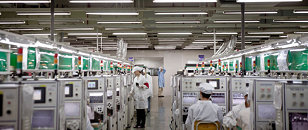Malaysian Government Targeting Front-end Semiconductor Manufacturing
Global tensions have caused big semiconductor manufacturers to consider a diversification of production facilities outside of China—most news headlines have concentrated on new operations or advancement/upgrades in the USA, India and Japan. As reported by the Financial Times, Malaysia has quietly established itself as a haven for big chip firms—a "free-trade zone" on the island of Penang is home to fancy Intel and Micron production operations. Team Blue's emerging next-gen Battlemage GPU was spotted during a summer 2023 press event—at the time, HardwareLuxx reported the existence of a "BMG G10" die in Intel Malaysia's Failure Lab. Micron celebrated its 45th anniversary last October, with the opening of a new cutting-edge assembly and test facility in Batu Kawan, Penang. The two firms—and a few others—established roots in Malaysia decades ago, but future investments are set to boost the nation's semiconductor industry.
According to Tom's Hardware: "Intel will spend a whopping $7 billion on new, Malaysian chip assembly and testing facilities. The overall total of foreign Malaysian investment in 2023 was $12.8 billion, and that exceeded its seven-year combined total from 2013 to 2020." Anwar Ibrahim, the country's Prime Minister, is keen to see manufacturing advance to a higher-value tier—a February FT.com interview reveals that this is a "critical goal" for his administration. The establishment of a front-end semiconductor manufacturing plant would be welcomed the most—Zafrul Aziz, Trade Minister of Malaysia, stated (to FT): "I am optimistic we will attract more than one. All it takes is one to kick-start a wave." Historically, Malaysian facilities have been created to deal with the back end of semiconductor supply chains—e.g. packing, assembling and testing components. Company leaderships consider these activities to be of lower value, due to their less complex nature. Certain foreign investments, into Malaysian plants, have come from Chinese firms—a growing presence of PRC-owned plants could complicate matters. The Financial Times article presents a possible future scenario, with the US Government stepping in...if alarmed to a certain degree.
According to Tom's Hardware: "Intel will spend a whopping $7 billion on new, Malaysian chip assembly and testing facilities. The overall total of foreign Malaysian investment in 2023 was $12.8 billion, and that exceeded its seven-year combined total from 2013 to 2020." Anwar Ibrahim, the country's Prime Minister, is keen to see manufacturing advance to a higher-value tier—a February FT.com interview reveals that this is a "critical goal" for his administration. The establishment of a front-end semiconductor manufacturing plant would be welcomed the most—Zafrul Aziz, Trade Minister of Malaysia, stated (to FT): "I am optimistic we will attract more than one. All it takes is one to kick-start a wave." Historically, Malaysian facilities have been created to deal with the back end of semiconductor supply chains—e.g. packing, assembling and testing components. Company leaderships consider these activities to be of lower value, due to their less complex nature. Certain foreign investments, into Malaysian plants, have come from Chinese firms—a growing presence of PRC-owned plants could complicate matters. The Financial Times article presents a possible future scenario, with the US Government stepping in...if alarmed to a certain degree.




